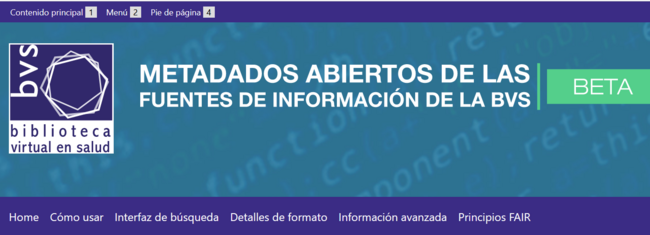With the aim of strengthening the democratization of access to health information and in line with open science initiatives, the Latin American and Caribbean Center for Health Sciences Information of the Pan American Health Organization/World Health Organization (BIREME/PAHO/WHO) makes available the Open Metadata Portal of the Information Sources of the Virtual Health Library (VHL). This initiative is in line with the Open Science institutional strategy and responds to the recommendations of the Center’s Governance Committees. The scientific information products and services of BIREME, with the Latin American and Caribbean Literature in Health Sciences database – LILACS[1]updated their journal inclusion criteria to include articles’ compliance with open science practices. Besides, the VHL Scientific Communication in Health It has just been reformulated to include scientific literature on open science, standards and guidelines for its adoption and indication of blogs that bring discussions on the subject, among other innovative topics.
In its beta version, in Portuguese, English and Spanish, the Open Metadata Portal of Information Sources of the VHL provides information so that the metadata can be reusable, that is, they can be downloaded in open formats and used by any user in infometric studies, searches and bibliographic reference managers, for example.
The easiest way to obtain VHL metadata is through the search interface. When performing a search combining the available fields and filters, the result can be exported by selecting one of the available formats: Extensible Markup Language (XML), JavaScript object notation (JSON), Research Information Systems Format (RIS), Comma Separated Values (CSV) year Really Simple Syndication (RSS). The portal also provides a self-assessment for compliance with the FAIR, Findable, Accessible, Interoperable and Reusable principles. Funbelievable, TOaccessible, Iinteroperable and Rreusable).
In addition, the VHL offers access to various sources of bibliographic information, such as LILACS, MEDLINE and national, thematic and institutional reference databases in health sciences. The technical-scientific documents available in these information sources are described by bibliographic metadata, following the LILACS Methodology, which allow identifying the title of the document, authors, abstract, DeCS/MeSH descriptors, author affiliation, year of publication, scientific journal, etc.
about metadata
Metadata is data about data, that is, it is information that allows organizing, classifying, relating and inferring new data about the data set. The metadata quality informed facilitates access to data and its better understanding and use by users.
On open science
Open science is a broad concept that encompasses several movements whose objective is to open the entire research cycle and seek to eliminate barriers to sharing any type of results, resources, methods or tools used in the research process. Thus, open access to journals, open research data, open source software, open collaboration, open peer review, open notebooks, open educational resources, open monographs, citizen science, or fundraising of research are within the limits of open science.
At the 41st General Conference of UNESCO, held in November 2021, its 193 Member States approved the adoption of the Recommendation on Open Science[2]. The Recommendation defines shared values and principles for Open Science and identifies concrete measures on Open Access and Open Data, with proposals to bring citizens closer to science and commitments to facilitate the production and dissemination of scientific knowledge throughout the world.
[1] Latin American and Caribbean Literature in Health Sciences. Criteria for Selection and Permanence of LILACS Brazil Journals. Version 2021. Available in: https://lilacs.bvsalud.org/es/lilacs-journals/criteria-for-selection-and-permanence-of-journals-lilacs-brasil-2021/
[2] United Nations Educational, Scientific and Cultural Organization. UNESCO recommendation on open science. November 2021. Available at: https://unesdoc.unesco.org/ark:/48223/pf0000379949.locale=es





